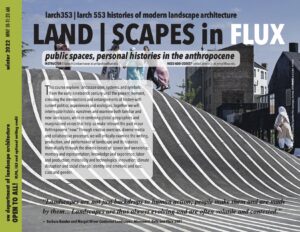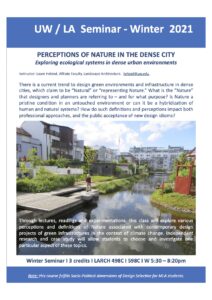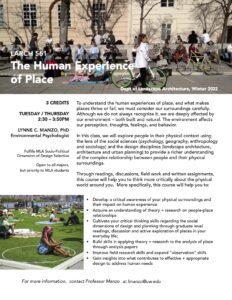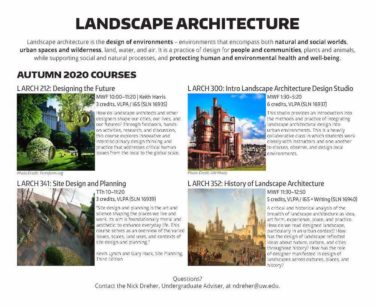Courses
We offer a wide variety of courses and are receiving increasing recognition for our leadership in the use of innovative teaching methods in studio courses, research on emerging landscape design issues, and community-building services.
Our courses integrate the development of core design skills with our research, teaching and service focus on urban ecological design. Highlights include:
- Culturally-based place making, through design build studio, cultural landscape, and community design studios
- Ecological infrastructure through natural processes, ecological planning and design, and landscape technology studios
- Design for ecological literacy in all coursework
- Participatory design in advanced landscape architecture and interdisciplinary studios
The University of Washington Course Catalog provides a general description for our courses. See below for recent and current course lists. Contact belarc@uw.edu for course syllabi.
2022 – 2023 Course Lists
Summer 2022 Courses for Non Majors + Special Topics
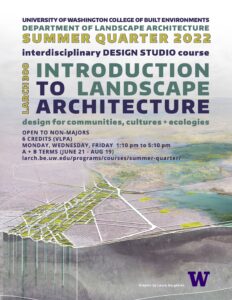
L ARCH 300 | Intro to Landscape Architecture Design Studio
Richard Desanto, Biruk Belay
6 credits, VLPA
MWF 1:30 – 5:30 PM
SLN: 11947
Questions? contact Jennie Li, jencyli@uw.edu
How do landscape architects and other designers shape our ciis, out lives, and our futures? Through fieldwork, hand-on activities, research, and discussion, this course explores innovative and interdisciplinary design thinking and practice that addresses critical human issues from the local to the global scale.
L ARCH 407 | Advanced Studio
Radical Botany: Speculative landscape futures at the intersectionality of plants, people, and place
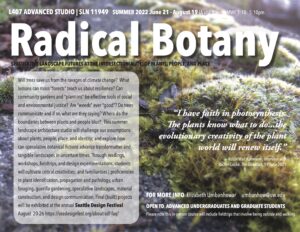
Elizabeth Umbanhowar
6 credits, VLPA/I&S
MWF 1:10 – 5:10 PM, Full Term (A and B)
SLN: 11949
Questions? contact Elizabeth, umbanhow@uw.edu
Open to Advanced Undergraduate and Graduate Students
Will trees save us from the ravages of climate change? What lessons can moss “forests” teach us about resilience? Can community gardens and “plant-ins” be effective tools of social and environmental justice? Are “weeds” ever “good”? Do trees communicate and if so, what are they saying? Where do the boundaries between plants and people blur? This summer landscape architecture studio will challenge our assumptions about plants, people, place, and identity; and explore how can speculative botanical fictions advance transformative and tangible landscapes in uncertain times. Through readings, workshops, fieldtrips, and design experimentations, students will cultivate critical creativities; and familiarities | proficiencies in plant identification, propagation and pathology, urban foraging, guerilla gardening, speculative landscapes, material construction, and design communication. Final (built) projects will be exhibited at the annual Seattle Design Festival August 20-26 https://seadesignfest.org/about-sdf-faq/
Autumn 2022 Courses for Non Majors + Special Topics
L ARCH 212 | Designing the Future
Instructor TBD
3 credits, VLPA/I&S
MWF 1:00 – 2:50 PM
SLN: 17203
Questions? contact Jennie Li, jencyli@uw.edu
How do landscape architects and other designers shape our ciis, out lives, and our futures? Through fieldwork, hand-on activities, research, and discussion, this course explores innovative and interdisciplinary design thinking and practice that addresses critical human issues from the local to the global scale.
L ARCH 300 | Intro to Landscape Architecture Design Studio
Instructor TBD
3 credits, VLPA
MWF 1:30-5:30 PM
SLN:17205
Questions? contact Jennie Li, jencyli@uw.edu
This studio provides an introduction into the methods and practice of integrating landscape architectural design into urban environments. This is a heavily collaborative class in which students work closely with instructors and one another to discuss, observe, and design local environments.
L ARCH 341 | Site Design and Planning
Eric Higbee
3 credits, VLPA
TTh 10-11:20 AM
SLN:17207
Questions? contact Jennie Li, jencyli@uw.edu
“Site design and planning is the art and science shaping the places we live and work. Its aim is foundationally moral and aesthetic: to enhance everyday life.” – Lynch and Hack, Site Planning
Through field trips, lectures, and discussion, this course will explore the varied ecological, cultural, political, and technical dimensions of shaping sites for people and the planet.
 L ARCH 352 | Histories of Landscape Architecture
L ARCH 352 | Histories of Landscape Architecture
Landscape History Lab: Experiments in (re)reading and (re)righting stories of landscape
Elizabeth Umbanhowar
5 credits, VLPA/I&S, Writing Credit
TTh 1:30-3:20 PM
SLN:17208
Questions? contact Jennie Li, jencyli@uw.edu
Fulfills BLA/MLA History requirement
Landscape architecture is more than the study of private gardens. Landscape histories bear witness to the diverse experiences, ideas, and people that, through time, have shaped space and place both exalted and everyday. Learning to “read” landscape and its histories offers important skills to challenge the legacies of colonialism and oppression, interrogate our present-day environmental crises, and navigate uncertain futures. In this survey course we critically examine the writing, production, and performance of global landscapes and their narratives from the Paleolithic to the mid-19th century.
 L ARCH 498A | Therapeutic Design for Human Health
L ARCH 498A | Therapeutic Design for Human Health
Dr. Amy Wagenfeld
3 credits
W 6-8:50
SLN:17226
Questions? contact Jennie Li, jencyli@uw.edu
Fulfills MLA Socio-Political Dimensions of Design
All Majors Welcome!
What if design was approached with a commitment to human health and wellness focused on the user and wellbeing?
Designers, planners, healthcare, and public and population health practitioners each have their own unique perspectives and each typically practice siloed from the others. Reported rates of collaboration between these groups is low, while potential to design for health and wellness is high, particularly as we navigate through the pressing issues of social and health inequities. By expanding awareness and creating opportunities to collaborate, this paradigm can change. As with most interprofessional collaboration, the respective professions profit; however, in the case of therapeutic design there is synergy and an even greater beneficiary: the end-user. This interdisciplinary seminar is timely and will provide students opportunities to learn about and engage in a conceptual collaborative therapeutic design project.
L ARCH 498D | Interdisciplinary frameworks for health, ecology, and the built environment
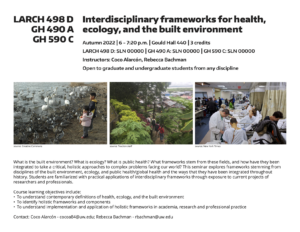
Coco Alarcón, Rebecca Bachman
3 credits
TTh 6-7:20
SLN: 23380
Contact: Coco Alarcón – cocoa84@uw.edu; Rebecca Bachman – rbachman@uw.edu
Fulfills BLA Ecology/UDP Elective
All Majors Welcome!
What is the built environment? What is ecology? What is public health? What frameworks stem from these fields, and how have they been integrated to take a critical, holistic approaches to complex problems facing our world? This seminar explores frameworks stemming from disciplines of the built environment, ecology, and public health/global health and the ways that they have been integrated throughout history. Students are familiarized with practical applications of interdisciplinary frameworks through exposure to current projects of researchers and professionals.
Course learning objectives include:
• To understand contemporary definitions of health, ecology, and the built environment
• To identify holistic frameworks and components
• To understand implementation and application of holistic frameworks in academia, research and professional practice
Past Terms
Spring 2022
Spring 2022 Courses for Non Majors + Special Topics
L ARCH 322 | Intro to Planting Design
Intro to Design with Living Materials
Kristi M. Park, RLA
3 credits, VLPA
MW 11:30a – 12:50, In-Person/Hybrid
SLN: 16115
Questions? contact Jennie Li, jencyli@uw.edu
As urban and rural areas continue to accommodate an ever-growing population, we must also reckon with harmful development patterns from the past. How do we balance equitable and healthy ecological and human health? We will tackle this question through an unsung heroic method; designing with living materials (aka. plants).
This quarter, we will continuously jump between global and site- specific scales through weekly exercises, diagramming, sketching, and observations. As an introductory course, prior knowledge of plants, space, drawing, design, or ecology is not required. However, a willingness to explore, discuss, exercise your imagination, think afresh, and work hard is essential.
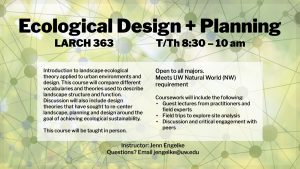
L ARCH 363 | Ecological Design + Planning
(undergraduates only)
Jenn Engelke
3 credits, NW
T, Th 8:30-10 AM, In-Person
SLN:16116
Questions? Email jengelke@uw.edu
Introduction to landscape ecological theory applied to urban environments and design. This course will compare different vocabularies and theories used to describe landscape structure and function. Discussion will also include design theories that have sought to re-center landscape, planning and design around the goal of achieving ecological sustainability.
Coursework will include the following:
- Guest lectures from practitioners and field experts
- Field trips to explore site analysis
- Discussion and critical engagement with peers
 L ARCH 412 | Field Sketching, Line, Tone and Composition
L ARCH 412 | Field Sketching, Line, Tone and Composition
Daniel Winterbottom
3 credits
T 11:30-2:20
SLN:16118
MLA/BLA priority
Questions? Email nina@u.washington.edu
As landscape architects, sketching is beneficial for two reasons, first for communicating with clients, and second as a means of understanding, documenting and comprehending the world around us. It can be a technique to quickly notate a scene, document a construction detail or create an artwork. In this course you will explore different techniques of sketching, line, shading, and hatching using pens, pencil charcoal and watercolor.
In a digital world where most of communication is done through computers the class aims at developing a stronger “brain to hand“ connection (often mentioned as crucial in design by such authors as the Finnish architect Juhani Pallasmaa) and nourishing the often forgotten craft of in-situ sketching. Urban and rural sketching (or simply field sketching), used as a method of portraying a scene at the very moment of direct sensory contact, is proven to develop skills of understanding the play of landscape elements, its character and narratives that intertwine through it.
AREAS OF INQUIRY
The drawing class is process based and students are encouraged to study new ways, methods and media of drawing and sketching. The class is split into three overlapping parts:
- Line drawing (pen or marker, form)
- Tone drawing (pencil or charcoal, shade and light)
- Selective colour (coloured pencil, marker, or watercolor)
 L ARCH 423 | Plant ID & Management
L ARCH 423 | Plant ID & Management
Botany for Built Environments
Dr. Brooke K. Sullivan
5 credits, I&S, Optional Writing, BLA/MLA History requirement
T Th 2:30-5:20
SLN:16119
Synchronous Hybrid
Questions? contact Jennie Li, jencyli@uw.edu
Fulfills MLA/BLA Plant ID
All Majors Welcome!
Plants, and the soil in which they grow, are living materials that form the foundational palette from which cultural communities, including landscape architects, design and cultivate landscapes. Students in this course will learn multiple ways of ‘knowing’ plants through investigative methods for species identification and key management considerations of Pacific Northwest native and naturalized plants. The course will include investigations into ethnobotanical histories, relationships with and uses for plants as well as key ecological conditions and maintenance considerations. As such, this course provides students with an opportunity to gain broad insights to botanical topics in landscape architecture including ethnobotany, horticulture, taxonomy, biological complexity and the structural and cultural contributions of plants to urban ecology.
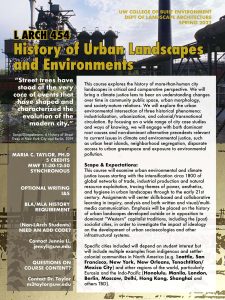
L ARCH 454 | History of Urban Landscapes and Environments
Maria C.Taylor, Ph.D
5 credits, I&S, Optional Writing, BLA/MLA History requirement
MWF 11:30-12:50
SLN:16122
Synchronous
Questions on content? Contact Dr. Taylor, m3taylor@uw.edu
Need an add code? Contact Jennie Li, jencyli@uw.edu
“Street trees have stood at the very core of events that have shaped and characterized the evolution of the modern city.”
– Sonja Dümpelmann, A History of Street Trees in New York City and Berlin, 2019
This course explores the history of more-than-human city landscapes in critical and comparative perspective. We will bring a climate justice lens to bear on understanding changes over time in community public space, urban morphology, and society-nature relations. We will explore the urban environmental intersection of three historical phenomena: industrialization, urbanization, and colonial/transnational circulation. By focusing on a wide range of city case studies and ways of knowing, we will engage with both dominant root causes and non-dominant alternative precedents relevant to current issues in climate and environmental justice, such as urban heat islands, neighborhood segregation, disparate access to urban greenspace and exposure to environmental pollution.
Scope & Expectations:
This course will examine urban environmental and climate justice issues starting with the intensification circa 1800 of global networks of trade, industrial production and natural resource exploitation, tracing themes of power, aesthetics, and hygiene in urban landscapes through to the early 21st century. Assignments will center skills-based and collaborative learning in inquiry, analysis and both written and visual/multi- media communication. Emphasis will be placed on the history of urban landscapes developed outside or in opposition to dominant “Western” capitalist traditions, including the (post) socialist cities, in order to investigate the impact of ideology on the development of urban socioecologies and other infrastructural systems.
Specific cities included will depend on student interest but will include multiple examples from indigenous and settler- colonial communities in North America (e.g. Seattle, San Francisco, New York, New Orleans, Tenochtitlan/ Mexico City) and other regions of the world, particularly Eurasia and the Indo-Pacific (Honolulu, Manila, London, Berlin, Moscow, Delhi, Hong Kong, Shanghai and others TBD).
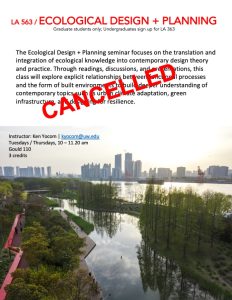
L ARCH 563 | Ecological Design + Planning
(graduates only) – CANCELLED
Ken Yocom
3 credits
T, Th 10-11:20 AM
SLN:16131
Questions? Email kyocom@uw.edu
The Ecological Design + Planning seminar focuses on the translation and integration of ecological knowledge into contemporary design theory and practice. Through readings, discussions, and presentations, this class will explore explicit relationships between functional processes and the form of built environments to build deeper understanding of contemporary topics such as urban climate adaptation, green infrastructure, and designing for resilience.
Winter 2022
Winter 2022 Courses for Non Majors + Special Topics
L ARCH 353 | L ARCH 553: Histories of Modern Landscape Architecture
LAND | SCAPES in FLUX public spaces, personal histories in the anthropocene
MWF 10:00-11:20
Elizabeth Umbanhowar, umbanhow@uw.edu
5 credits, VLPA or I&S + Optional Writing
(SLN: 16254, Honors SLN: 16255)
Contact Jennie Li, jencyli@uw.edu for add codes.
This course explores landscape sites, systems, and symbols from the early nineteenth century until the present moment, stressing the intersections and entanglements of history with current politics, experiences and ecologies. Together we will interrogate historic narratives and examine both familiar and new landscapes, while re-centering global geographies and marginalized voices that help us make relevant the past in our Anthropocene “now.” Through creative exercises, diverse media and collaborative processes, we will critically examine the writing, production, and performance of landscape and its histories thematically through the diverse lenses of: power and ownership; memory and representation; knowledge and experience; labor and production; materiality and technological innovation; climate disruption and social change; identity and emotion; and race, class and gender.
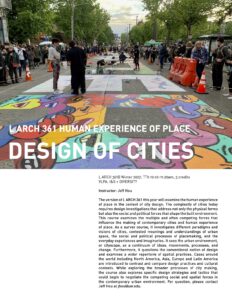
L ARCH 361: Human Experience of Place (Undergraduate)
TTH 10:00-11:20
Jeff Hou
3 credits, VLPA/I&S, Diversity (SLN 16257)
The version of L ARCH 361 this year will examine the human experience of place in the context of city design. The complexity of cities today requires design investigations that address not only the physical forms but also the social and political forces that shape the built environment. This course examines the multiple and often competing forces that influence the making of contemporary cities and human experience of place. As a survey course, it investigates different paradigms and visions of cities, contested meanings and understandings of urban space, the social and political processes of placemaking, and the everyday experiences and imaginaries. It sees the urban environment, or cityscape, as a continuum of ideas, movements, processes, and change. Furthermore, it questions the conventional notion of design and examines a wider repertoire of spatial practices. Cases around the world including North America, Asia, Europe and Latin America are introduced to contrast and compare design practices and cultural contexts. While exploring the broader processes of city making, the course also explores specific design strategies and tactics that could begin to negotiate the competing social and spatial forces in the contemporary urban environment. For question, please contact Jeff Hou at jhou@uw.edu.
L ARCH 498C: Perceptions of Nature in the Dense City
W 5:30-8:20 PM
Laure Heland heland@uw.edu
3 credits, VLPA/I&S, Diversity (SLN: 16263)
Fulfills Socio-Political Dimensions of Design selective for MLA students
There is a current trend to design green environments and infrastructure in dense cities, which claim to be “Natural” or “representing Nature.” What is the “Nature” that designers and planners are referring to – and for what purpose? Is Nature a pristine condition in an untouched environment or can it be a hybridization of human and natural systems? How do such definitions and perceptions impact both professional approaches, and the public acceptance of new design idioms?
Through lectures, readings and experimentations, this class will explore various perceptions and definitions of Nature associated with contemporary design projects of green infrastructures in the context of climate change. Independent research and case study will allow students to choose and investigate one particular aspect of these topics.
L ARCH 561: The Human Experience of Place (Graduate)
T TH 2:30-3:50 PM
Lynne Manzo, lmanzo@uw.edu
3 credits (SLN: 16268)
Fulfills Socio-Political Dimensions of Design selective for MLA students
To understand the human experiences of place, and what makes places thrive or fail, we must consider our surroundings carefully. Although we do not always recognize it, we are deeply affected by our environment – both built and natural. The environment affects our perception, thoughts, feelings, and behavior.
In this class, we will explore people in their physical context using the lens of the social sciences (psychology, geography, anthropology and sociology) and the design disciplines (landscape architecture, architecture and urban planning) to provide a richer understanding of the complex relationship between people and their physical surroundings.
Through readings, discussions, field work and written assignments, this course will help you to think more critically about the physical world around you. More specifically, this course will help you to:
- Develop a critical awareness of your physical surroundings and their impact on human experience
- Acquire an understanding of theory + research on people-place relationships
- Cultivate your critical thinking skills regarding the social dimensions of design and planning through graduate level readings, discussion and active exploration of places in your everyday life;
- Build skills in applying theory + research to the analysis of place through analysis papers
- Improve field research skills and expand “observation” skills
- Gain insights into what contributes to effective + appropriate design to address human needs
Autumn 2021
Autumn 2021 Courses
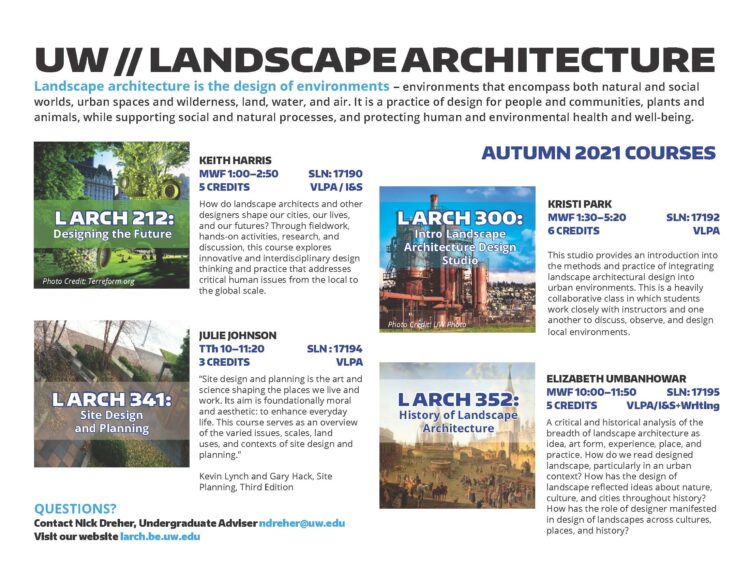
L ARCH 212: Designing the Future
MWF 1:00–2:50
Keith Harris
5 credits, VLPA or I&S (SLN: 17190)
Contact Nick Dreher, ndreher@uw.edu for questions.
How do landscape architects and other designers shape our cities, our lives, and our futures? Through fieldwork, hands-on activities, research, and discussion, this course explores innovative and interdisciplinary design thinking and practice that addresses critical human issues from the local to the global scale.
L ARCH 300: Intro to Landscape Architecture Design Studio
MWF 1:30–5:20
Kristi Park
6 credits, VLPA (SLN: 17192)
Contact Nick Dreher, ndreher@uw.edu for questions.
This studio provides an introduction into the methods and practice of integrating landscape architectural design into urban environments. This is a heavily collaborative class in which students work closely with instructors and one another to discuss, observe, and design local environments.
L ARCH 341: Site Design + Planning
TTh 10:00–11:20
3 credits, VLPA (SLN: 17194)
Contact Nick Dreher, ndreher@uw.edu for questions.
“Site design and planning is the art and science shaping the places we live and work. Its aim is foundationally moral and aesthetic: to enhance everyday life. This course serves as an overview of the varied issues, scales, land uses, and contexts of site design and planning.”
Kevin Lynch and Gary Hack, Site Planning, Third Edition
L ARCH 352: History of Landscape Architecture “(re)Righting Landscapes”
Course Flyer
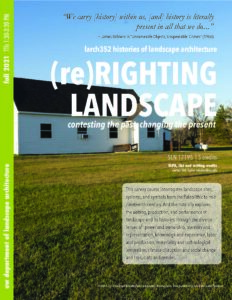 TTh 1:30–3:20
TTh 1:30–3:20
Elizabeth Umbanhowar
5 credits, VLPA or I&S + Writing (SLN: 17195)
Contact Nick Dreher, ndreher@uw.edu for questions.
This survey course interrogates landscape sites, systems, and symbols from the Paleolithic to mid-nineteenth century. And thematically explores the writing, production, and performance of landscape and its histories through the diverse lenses of: power and ownership, memory and representation, knowledge and experience, labor and production, materiality and technological innovation, climate disruption and social change and race, class and gender.
L ARCH 498: Therapeutic Design for Human Health, an Interdisciplinary Seminar
Course Flyer
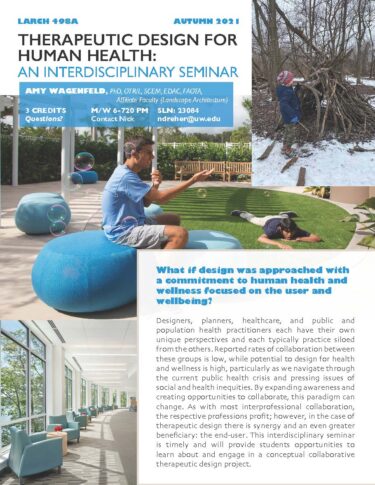 MW 6:00–7:20 PM
MW 6:00–7:20 PM
Amy Wagenfeld, PhD, OTR/L, SCEM, EDAC, FAOTA, Affiliate Faculty in Landscape Architecture
3 credits (SLN: 23084)
Contact Nick Dreher, ndreher@uw.edu for questions.
What if design was approached with a commitment to human health and wellness focused on the user and wellbeing? Designers, planners, healthcare, and public and population health practitioners each have their own unique perspectives and each typically practice siloed from the others. Reported rates of collaboration between these groups is low, while potential to design for health and wellness is high, particularly as we navigate through the current public health crisis and pressing issues of social and health inequities. By expanding awareness and creating opportunities to collaborate, this paradigm can change. As with most interprofessional collaboration, the respective professions profit; however, in the case of therapeutic design there is synergy and an even greater beneficiary: the end-user. This interdisciplinary seminar is timely and will provide students opportunities to learn about and engage in a conceptual collaborative therapeutic design project.
L ARCH 498: Digital Fabrication in Landscape Architecture
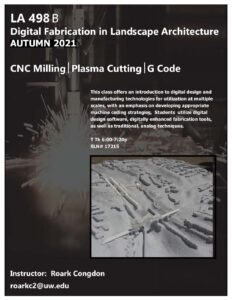 TTh 6:00–7:20 PM
TTh 6:00–7:20 PM
Roark Congdon, roarkc2@uw.edu
3 credits (SLN: 17215)
Offers an introduction to digital design and manufacturing technologies for utilization at multiple scales. An emphasis on developing appropriate machine coding strategies. Students utilize digital design software, digitally enhanced fabrication tools, as well as traditional, analog techniques.
Summer 2021
Summer 2021 Courses
L ARCH 300: Introduction to Landscape Architecture Studio
Course Flyer
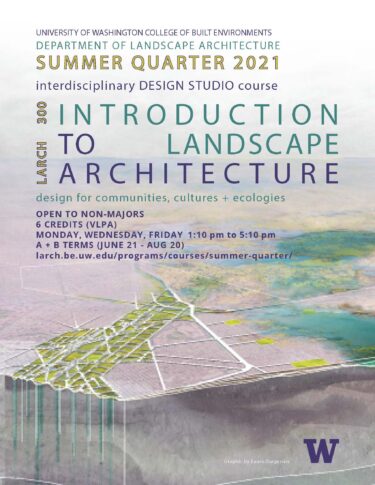
MWF 110–1250 | Full-term
Patrick Pirtle + Biruk Belay
6 credits, VLPA (SLN 11943)
Contact Nick Dreher, ndreher@uw.edu for questions.
Introduction to history and environmental influences in field while developing design and graphic skills. Site analyses and drawing to convey design concepts. Relationship of visual perception to drawing, role of values in design, verbal communication, and behavioral analysis of design process. Required for admission to Bachelor of Landscape Architecture program.
L ARCH 407 | Advanced Studio: Taking it to the Streets
Course Flyer
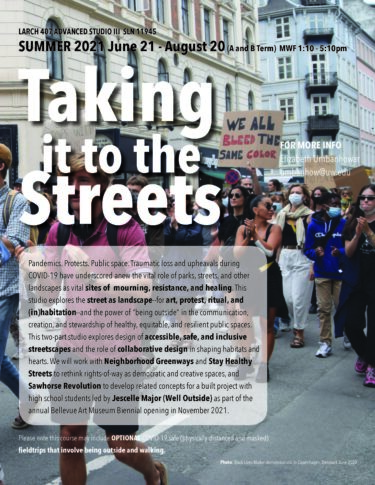
MWF 110–1250 | Full-term
Elizabeth Umbanhowar
6 credits (SLN 11945)
For Add Codes, please contact Jenni Li (jencyli@uw.edu)
Pandemics. Protests. Public space. Traumatic loss and upheavals during COVID-19 have underscored anew the vital role of parks, streets, and other landscapes as vital sites of mourning, resistance, and healing. This studio explores the street as landscape–for art, protest, ritual, and (in)habitation–and the power of “being outside” in the communication, creation, and stewardship of healthy, equitable, and resilient public spaces.
This two-part studio explores design of accessible, safe, and inclusive streetscapes and the role of collaborative design in shaping habitats and hearts. We will work with Neighborhood Greenways and Stay Healthy Streets to rethink rights-of-way as democratic and creative spaces, and Sawhorse Revolution to develop related concepts for a built project with high school students led by Jescelle Major (Well Outside) as part of the annual Bellevue Art Museum Biennial opening in November 2021.
CANCELED: L ARCH 498 | Special Topics: Landscape Literacy
Course Flyer
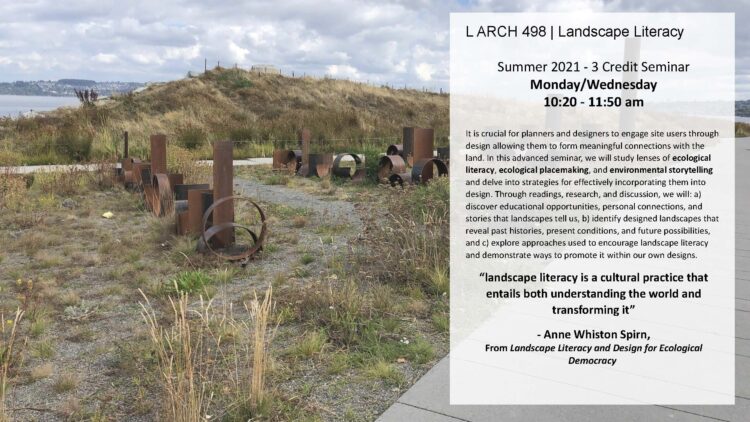
MW 1020–1150 | Full-term
Jenn Engelke
3 credits (SLN 11948)
Questions? Please contact Nick Dreher (ndreher@uw.edu)
It is crucial for planners and designers to engage site users through design allowing them to form meaningful connections with the land. In this advanced seminar, we will study lenses of ecological literacy, ecological placemaking, and environmental storytelling and delve into strategies for effectively incorporating them into design. Through readings, research, and discussion, we will:
a) discover educational opportunities, personal connections, and
stories that landscapes tell us,
b) identify designed landscapes that reveal past histories, present conditions, and future possibilities, and
c) explore approaches used to encourage landscape literacy and demonstrate ways to promote it within our own designs.
“landscape literacy is a cultural practice that entails both understanding the world and transforming it”
– Anne Whiston Spirn,
From Landscape Literacy and Design for Ecological Democracy
Spring 2021
Courses for non-majors and special topics
L ARCH 322: Intro to Design with Living Materials
Course Flyer
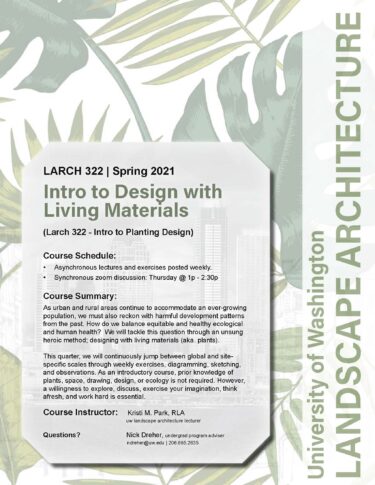 TTh 100–1250 | Kristi Park, RLA
TTh 100–1250 | Kristi Park, RLA
3 credits, VLPA (SLN 15870)
Contact Nick Dreher, ndreher@uw.edu for questions.
Course Schedule:
- Asynchronous lectures and exercises posted weekly.
- Synchronous zoom discussion: Thursday @ 1p – 2:30p
Course Summary:
As urban and rural areas continue to accommodate an ever growing population, we must also reckon with harmful development patterns from the past. How do we balance equitable and healthy ecological and human health? We will tackle this question through an unsung heroic method; designing with living materials (aka. plants).
This quarter, we will continuously jump between global and site-specific scales through weekly exercises, diagramming, sketching, and observations. As an introductory course, prior knowledge of plants, space, drawing, design, or ecology is not required. However, a willingness to explore, discuss, exercise your imagination, think afresh, and work hard is essential.
L ARCH 363/563: Ecological Design and Planning
Course Flyer
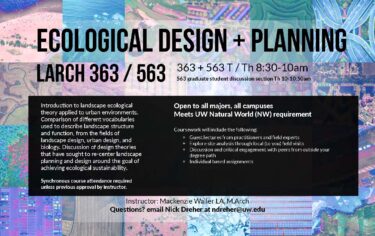 TTh 830–950 | Mackenzie Waller, MLA+MArch
TTh 830–950 | Mackenzie Waller, MLA+MArch
3 credits, NW (SLN 15871)
Contact Nick Dreher, ndreher@uw.edu for questions.
Introduction to landscape ecological theory applied to urban environments. Comparison of different vocabularies used to describe landscape structure and function, from the fields of landscape design, urban design, and biology. Discussion of design theories that have sought to re-center landscape planning and design around the goal of achieving ecological sustainability. Synchronous course attendance required unless previous approval by instructor.
563 graduate student discussion section Th 10-10:50am.
L ARCH 423: Plant Identification + Management
Course Flyer
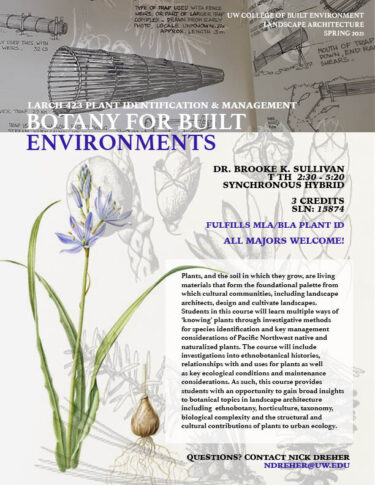 TTh 230-520 | Brooke Sullivan, PhD
TTh 230-520 | Brooke Sullivan, PhD
3 credits (SLN 15874)
Contact Nick Dreher, ndreher@uw.edu for questions.
Plants, and the soil in which they grow, are living materials that form the foundational palette from which cultural communities, including landscape architects, design and cultivate landscapes. Students in this course will learn multiple ways of ‘knowing’ plants through investigative methods for species identification and key management considerations of Pacific Northwest native and naturalized plants. The course will include investigations into ethnobotanical histories, relationships with and uses for plants as well as key ecological conditions and maintenance considerations. As such, this course provides students with an opportunity to gain broad insights to botanical topics in landscape architecture including ethnobotany, horticulture, taxonomy, biological complexity and the structural and cultural contributions of plants to urban ecology.
L ARCH 454: History of Urban Landscapes + Environments
Course Flyer
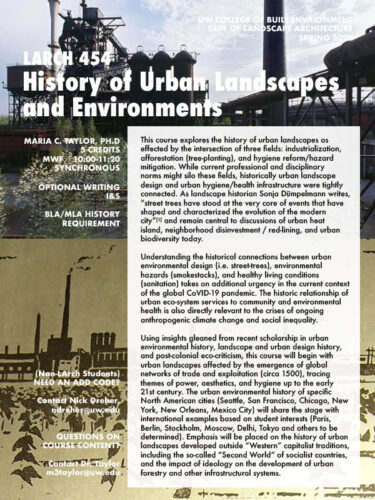 MWF 1000-1120 | Maria Taylor, PhD
MWF 1000-1120 | Maria Taylor, PhD
5 credits, I&S + Optional Writing (SLN 15877)
Contact Nick Dreher, ndreher@uw.edu for questions.
This course explores the history of urban landscapes as effected by the intersection of three fields: industrialization, afforestation (tree-planting), and hygiene reform/hazard mitigation. While current professional and disciplinary norms might silo these fields, historically urban landscape design and urban hygiene/health infrastructure were tightly connected. As landscape historian Sonja Dümpelmann writes, “street trees have stood at the very core of events that have shaped and characterized the evolution of the modern city”[1] and remain central to discussions of urban heat island, neighborhood disinvestment / red-lining, and urban biodiversity today.
Understanding the historical connections between urban environmental design (i.e. street-trees), environmental hazards (smokestacks), and healthy living conditions (sanitation) takes on additional urgency in the current context of the global CoVID-19 pandemic. The historic relationship of urban eco-system services to community and environmental health is also directly relevant to the crises of ongoing anthropogenic climate change and social inequality.
Using insights gleaned from recent scholarship in urban environmental history, landscape and urban design history, and post-colonial eco-criticism, this course will begin with urban landscapes affected by the emergence of global networks of trade and exploitation (circa 1500), tracing themes of power, aesthetics, and hygiene up to the early 21st century. The urban environmental history of specific North American cities (Seattle, San Francisco, Chicago, New York, New Orleans, Mexico City) will share the stage with international examples based on student interests (Paris, Berlin, Stockholm, Moscow, Delhi, Tokyo and others to be determined). Emphasis will be placed on the history of urban landscapes developed outside “Western” capitalist traditions, including the so-called “Second World” of socialist countries, and the impact of ideology on the development of urban forestry and other infrastructural systems.
L ARCH 498/598 (see also ANTH 469 + JSIS 484/584): Special Topics: Spaces of Creative Resistance in East Asia
Course Flyer
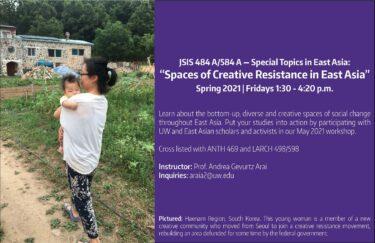 F 130-520 | Andrea Gervurtz Arai
F 130-520 | Andrea Gervurtz Arai
5 credits (SLN 15879)
Contact Andrea Arai, araia2@uw.edu for questions.
Learn about the bottom-up, diverse and creative spaces of social change throughout East Asia. Put your studies into action by participating with UW and East Asian scholars and activists in our May 2021 workshop.
L ARCH 598 Special Topics: Design Justice Seminar
Course Flyer
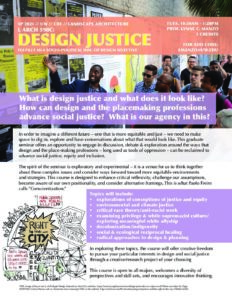 T1030-120 | Lynne Manzo
T1030-120 | Lynne Manzo
3 credits (SLN 15887)
Contact Prof. Lynne Manzo for add codes, lmanzo@uw.edu.
What is design justice and what does it look like? How can design and the placemaking professions advance social justice? What is our agency in this?
In order to imagine a different future – one that is more equitable and just – we need to make space to dig in, explore and have conversations about what that would look like. This graduate seminar offers an opportunity to engage in discussion, debate & exploration around the ways that design and the place-making professions – long used as tools of oppression – can be reclaimed to advance social justice, equity and inclusion.
The spirit of the seminar is exploratory and experimental – it is a venue for us to think together about these complex issues and consider ways forward toward more equitable environments and strategies. This course is designed to enhance critical reflexivity, challenge our assumptions, become aware of our own positionality, and consider alternative framings. This is what Paolo Freire calls “Conscientization.”
Topics will include:
- explorations of conceptions of justice and equity
- environmental and climate justice
- critical race theory/anti-racist work
- examining privilege & white supremacist culture/exploring meaningful white allyship
- decolonization/indigeneity
- social & ecological reciprocal healing
- radical approaches to design & planning
In exploring these topics, the course will offer creative freedom to pursue your particular interests in design and social justice through a creative/research project of your choosing
This course is open to all majors, welcomes a diversity of perspectives and skill sets, and encourages innovative thinking.
Winter 2021
Courses for non-majors and special topics
L ARCH 353: Modern History of Landscape Architecture
MWF 1130–1250 | Maria Taylor
5 credits, VLPA/I&S, Optional Writing (SLN 16157)
Honors section (contact Nick Dreher, ndreher@uw.edu for add code)
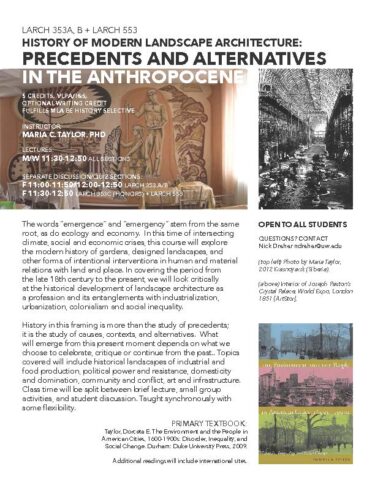 The words “emergence” and “emergency” stem from the same root, as do ecology and economy. In this time of intersecting climate, social and economic crises, this course will explore the modern history of gardens, designed landscapes, and other forms of intentional interventions in human and material relations with land and place. In covering the period from the late 18th century to the present, we will look critically at the historical development of landscape architecture as a profession and its entanglements with industrialization, urbanization, colonialism and social inequality.
The words “emergence” and “emergency” stem from the same root, as do ecology and economy. In this time of intersecting climate, social and economic crises, this course will explore the modern history of gardens, designed landscapes, and other forms of intentional interventions in human and material relations with land and place. In covering the period from the late 18th century to the present, we will look critically at the historical development of landscape architecture as a profession and its entanglements with industrialization, urbanization, colonialism and social inequality.
History in this framing is more than the study of precedents; it is the study of causes, contexts, and alternatives. What will emerge from this present moment depends on what we choose to celebrate, critique or continue from the past.. Topics covered will include historical landscapes of industrial and food production, political power and resistance, domesticity and domination, community and conflict, art and infrastructure. Class time will be split between brief lecture, small group activities, and student discussion. Taught synchronously with some flexibility.
L ARCH 361: Human Experience of Place
Taught asynchronously | Jeff Hou
3 credits, VLPA/I&S, Diversity (SLN 16159)
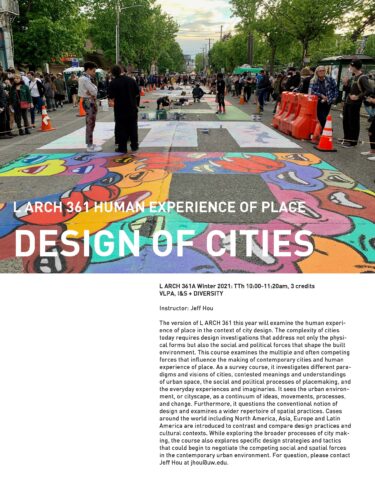 The version of L ARCH 361 this year will examine the human experience of place in the context of city design. The complexity of cities today requires design investigations that address not only the physical forms but also the social and political forces that shape the built environment. This course examines the multiple and often competing forces that influence the making of contemporary cities and human experience of place. As a survey course, it investigates different paradigms and visions of cities, contested meanings and understandings of urban space, the social and political processes of placemaking, and the everyday experiences and imaginaries. It sees the urban environment, or cityscape, as a continuum of ideas, movements, processes, and change. Furthermore, it questions the conventional notion of design and examines a wider repertoire of spatial practices. Cases around the world including North America, Asia, Europe and Latin America are introduced to contrast and compare design practices and cultural contexts. While exploring the broader processes of city making, the course also explores specific design strategies and tactics that could begin to negotiate the competing social and spatial forces in the contemporary urban environment. For question, please contact Jeff Hou at jhou@uw.edu.
The version of L ARCH 361 this year will examine the human experience of place in the context of city design. The complexity of cities today requires design investigations that address not only the physical forms but also the social and political forces that shape the built environment. This course examines the multiple and often competing forces that influence the making of contemporary cities and human experience of place. As a survey course, it investigates different paradigms and visions of cities, contested meanings and understandings of urban space, the social and political processes of placemaking, and the everyday experiences and imaginaries. It sees the urban environment, or cityscape, as a continuum of ideas, movements, processes, and change. Furthermore, it questions the conventional notion of design and examines a wider repertoire of spatial practices. Cases around the world including North America, Asia, Europe and Latin America are introduced to contrast and compare design practices and cultural contexts. While exploring the broader processes of city making, the course also explores specific design strategies and tactics that could begin to negotiate the competing social and spatial forces in the contemporary urban environment. For question, please contact Jeff Hou at jhou@uw.edu.
L ARCH 498: Climate Changed Urban Agriculture
TTh 1.00–2.20 | Julie Johnson
3 credits (SLN 16159)
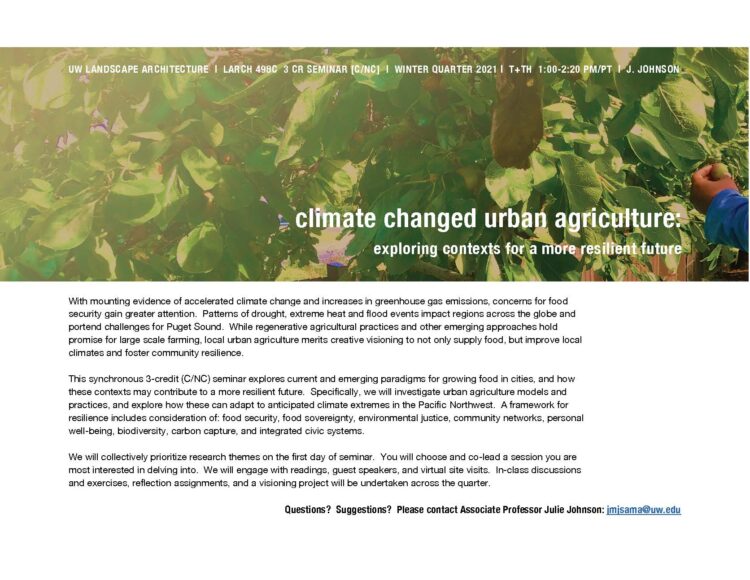 With mounting evidence of accelerated climate change and increases in greenhouse gas emissions, concerns for food security gain greater attention. Patterns of drought, extreme heat and flood events impact regions across the globe and portend challenges for Puget Sound. While regenerative agricultural practices and other emerging approaches hold promise for large scale farming, local urban agriculture merits creative visioning to not only supply food, but improve local climates and foster community resilience.
With mounting evidence of accelerated climate change and increases in greenhouse gas emissions, concerns for food security gain greater attention. Patterns of drought, extreme heat and flood events impact regions across the globe and portend challenges for Puget Sound. While regenerative agricultural practices and other emerging approaches hold promise for large scale farming, local urban agriculture merits creative visioning to not only supply food, but improve local climates and foster community resilience.
This synchronous 3-credit (C/NC) seminar explores current and emerging paradigms for growing food in cities, and how these contexts may contribute to a more resilient future. Specifically, we will investigate urban agriculture models and practices, and explore how these can adapt to anticipated climate extremes in the Pacific Northwest. A framework for resilience includes consideration of: food security, food sovereignty, environmental justice, community networks, personal well-being, biodiversity, carbon capture, and integrated civic systems.
We will collectively prioritize research themes on the first day of seminar. You will choose and co-lead a session you are most interested in delving into. We will engage with readings, guest speakers, and virtual site visits. In-class discussions and exercises, reflection assignments, and a visioning project will be undertaken across the quarter.
Questions? Suggestions? Please contact Associate Professor Julie Johnson: jmjsama@uw.edu
Autumn 2020
Courses for non-majors and special topics
L ARCH 212: Designing the Future
Taught asynchronously | Keith Harris
5 credits, VLPA / I&S (SLN 16935)
How do landscape architects and other designers shape our cities, our lives, and our futures? Through fieldwork, hands-on activities, research, and discussion, this course explores innovative and interdisciplinary design thinking and practice that addresses critical human issues from the local to the global scale.
L ARCH 300: Intro Landscape Architecture Design Studio
MWF 1:30–5:20
6 credits, VLPA (SLN 16937)
This studio provides an introduction into the methods and practice of integrating landscape architectural design into urban environments. This is a heavily collaborative class in which students work closely with instructors and one another to discuss, observe, and design local environments.
L ARCH 341: Site Design and Planning
TTh 10–11:20
3 credits, VLPA (SLN 16939)
“Site design and planning is the art and science shaping the places we live and work. Its aim is foundationally moral and aesthetic: to enhance everyday life. This course serves as an overview of the varied issues, scales, land uses, and contexts of site design and planning.”
L ARCH 352: History of Landscape Architecture
MWF 12:00–1:20
5 credits, VLPA / I&S + Writing (SLN 16940)
A critical and historical analysis of the breadth of landscape architecture as idea, art form, experience, place, and practice. How do we read designed landscape, particularly in an urban context? How has the design of landscape reflected ideas about nature, culture, and cities throughout history? How has the role of designer manifested in design of landscapes across cultures, places, and history?
2021–2022 Course Lists
2020–2021 Course Lists
2019–2020 Course Lists
2020 Summer Courses of Interest
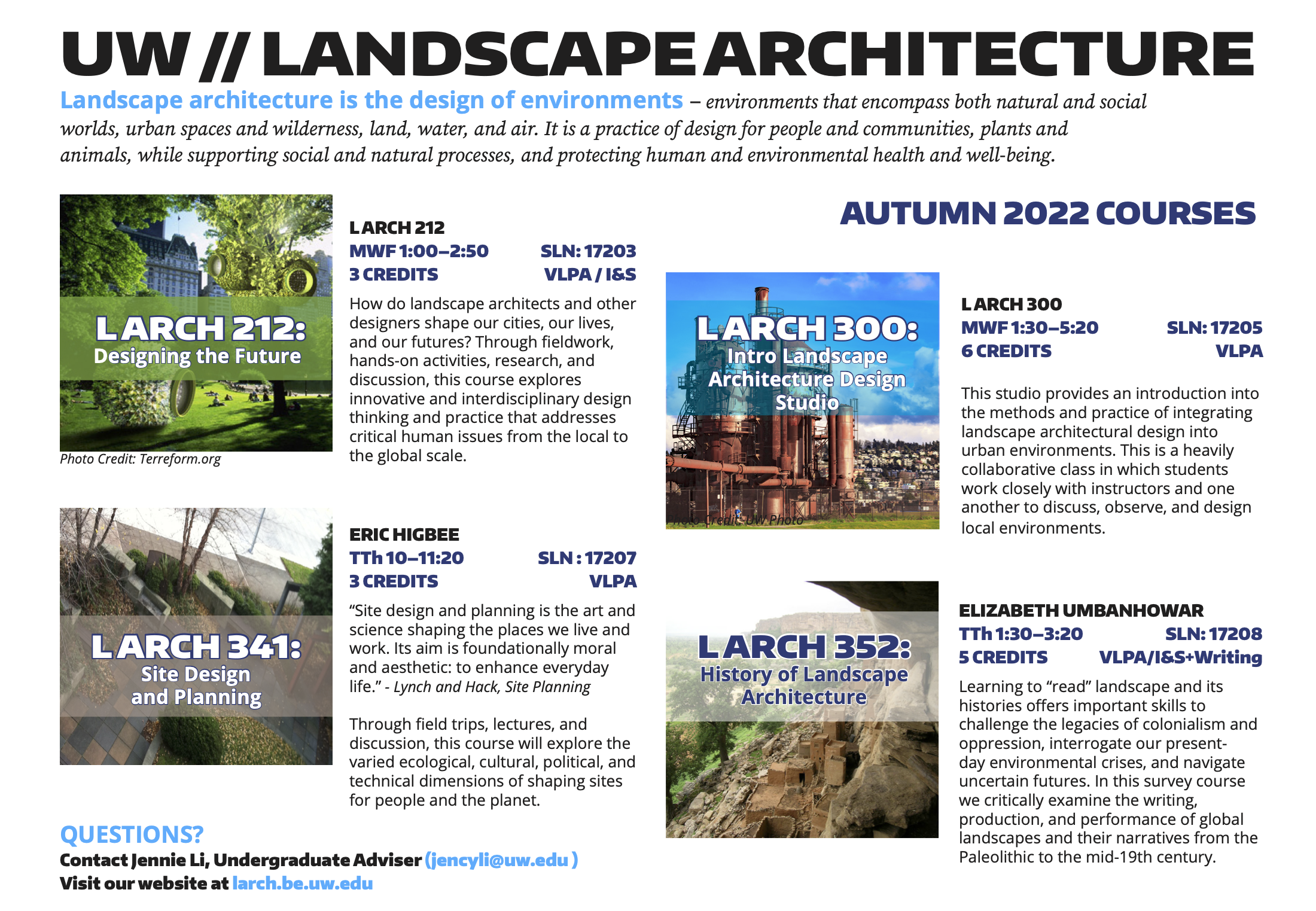
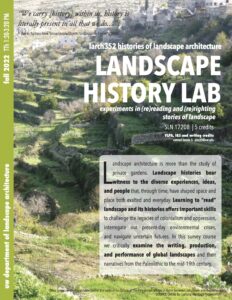 L ARCH 352 | Histories of Landscape Architecture
L ARCH 352 | Histories of Landscape Architecture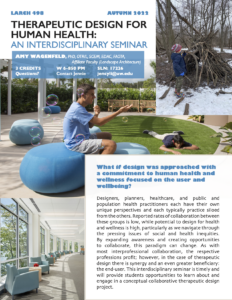 L ARCH 498A | Therapeutic Design for Human Health
L ARCH 498A | Therapeutic Design for Human Health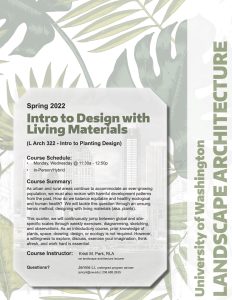
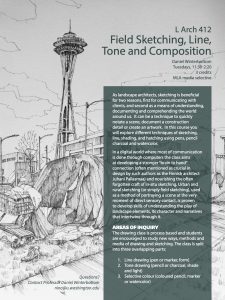 L ARCH 412 | Field Sketching, Line, Tone and Composition
L ARCH 412 | Field Sketching, Line, Tone and Composition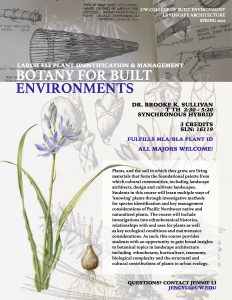 L ARCH 423 | Plant ID & Management
L ARCH 423 | Plant ID & Management